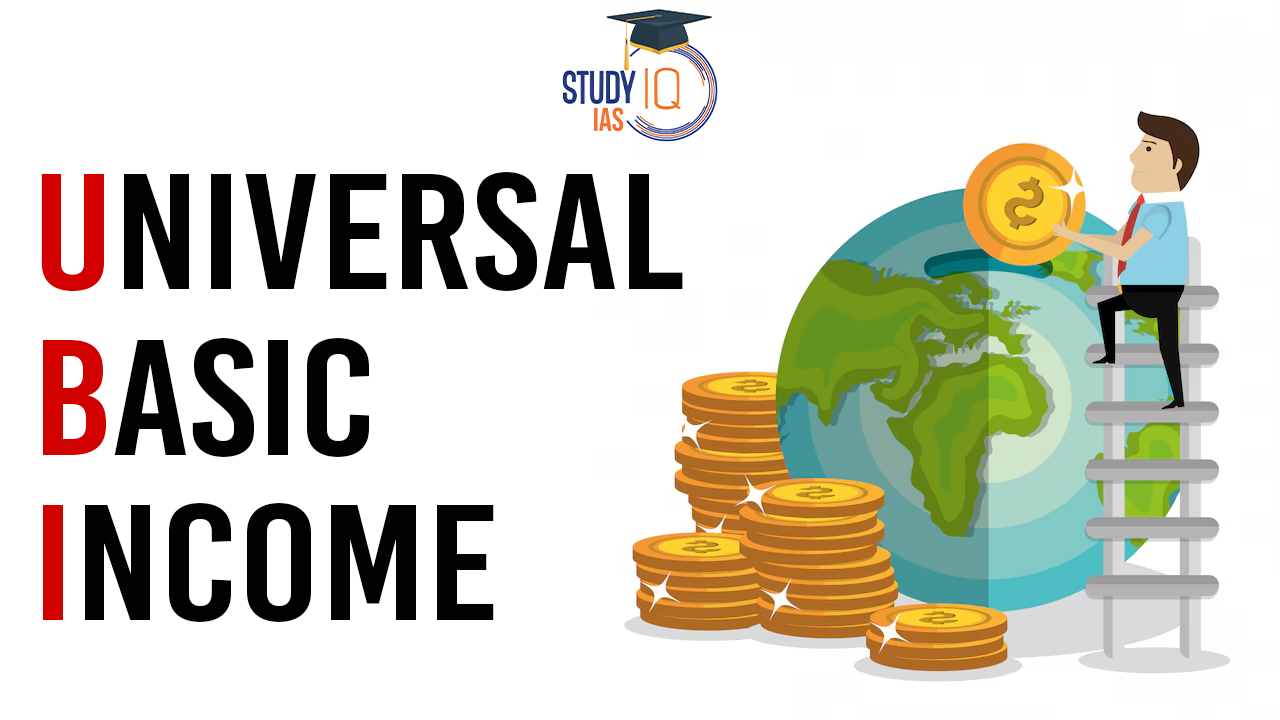Table of Contents
Context: Bill Gates’ overall vision is that AI could generate enough wealth and efficiency to make UBI feasible, but realizing this vision will require effective policy, taxation, and wealth redistribution strategies.
What is Meant by Universal Basic Income (UBI)?
Universal Basic Income (UBI) refers to a regular, unconditional payment made by the government (or another entity) to all citizens, regardless of employment status or income level.
Core Principles
- Unconditional: No requirements related to work or income level.
- Universal: Provided to all citizens, not just specific groups.
- Periodic: Paid at regular intervals (monthly, annually).
- Cash-based: Given in cash rather than goods or services.
Advantages of Universal Basic Income (UBI)
- Improved Targeting of the Poor: UBI eliminates exclusion errors, ensuring no poor citizen is left out of welfare benefits.
- It ensures marginalised communities have access to financial support, improving social equity.
- Flexibility in Expenditure: Beneficiaries have the freedom to decide how to spend the money based on their needs.
- This empowers individuals to manage their finances independently, respecting their personal choices.
- Insurance Against Shocks: UBI serves as a safety net, protecting people from financial shocks like unemployment or health crises.
- It helps reduce poverty and vulnerability, offering economic security during tough times.
- Financial Inclusion: UBI can increase access to banking and credit for financially insecure individuals.
- The use of digital infrastructure (Jan-Dhan, Aadhaar, Mobile) can improve transparency and efficiency.
- Minimum Standard of Living: UBI ensures basic capabilities like health, education, and a stable income, allowing people to afford better-quality goods.
- Administrative Efficiency: UBI can streamline government welfare by reducing the complexity of multiple schemes, and lowering administrative costs.
Disadvantages of Universal Basic Income (UBI)
- UBI might reduce work motivation, as people may rely on guaranteed income and quit their jobs, leading to reduced economic productivity.
- The scarcity of cheap labour could drive up prices, making basic goods harder to afford, and impacting economic stability.
- It could contribute to inflationary pressures by increasing overall demand for goods and services without a corresponding rise in supply, leading to higher prices.
- In some households, men may control the spending of UBI, potentially leading to misuse or unequal benefits for women.
- UBI is universal, meaning even the wealthy receive it, which could lead to objections and concerns about the fair use of state resources.
Need for Universal Basic Income (UBI) in India
- Rising Unemployment: According to the ILO, 83% of India’s unemployed population is youth.
- Growing Inequality: India’s Gini coefficient, a measure of income inequality, has been increasing over the years.
- Jobless Growth: India’s economy has experienced growth, but this has not translated into commensurate job creation.
- Automation and AI: Advancements in automation and AI are leading to job displacement in various sectors.
- Inadequate Social Safety Nets: India’s existing social safety nets are often insufficient to provide adequate support to vulnerable populations.
Arguments Against UBI
- Dignity of Work: Providing income without work may lead to societal alienation, as individuals without employment might be perceived negatively.
- Challenges of Capitalism: The inability of the current economic system to generate sufficient employment is a key issue.
- In this model, income is typically tied to work, and UBI challenges this by providing income regardless of employment, which could be seen as a failure of the system to offer adequate jobs.
- Labour Market Distortion: UBI may discourage formal employment, particularly in economies where informal labour is prevalent, leading to a further decline in job participation rates.
- Labour Market Adjustments: Technological advancements such as automation and AI may lead to job losses, but the labour market has the potential to adjust, with skill development being a more sustainable solution.
Arguments For UBI
- Addressing Unemployment and Economic Demand: UBI could inject much-needed income into the economy, boosting demand and stimulating growth in situations where unemployment has led to a contraction in market demand.
- Dealing with Automation and Inequality: UBI could help mitigate the effects of “jobless growth” caused by automation and digital industries, which have led to rising inequality and job losses.
- Financial Support for Self-Employed Workers: As more individuals turn to low-income self-employment due to a lack of job opportunities, UBI could provide a safety net, helping to bridge the income gap.
Challenges of Implementing UBI in India
- Size of Informal Economy: With around 80-90% of the workforce engaged in informal, cash-based activities, implementing UBI in such an unregulated economy presents major challenges.
- Financial Burden: Providing UBI to over 1.4 billion citizens would impose a heavy financial strain on the government, requiring robust taxation and fiscal management.
- Targeting the Vulnerable: Ensuring that UBI effectively reaches the most vulnerable in India’s diverse population would require sophisticated administrative systems and accurate data infrastructure to prevent misuse.
- Impact on Labour Market: UBI could potentially discourage participation in formal employment, particularly in a country with a large informal sector, necessitating careful design to complement, not replace, formal job opportunities.
- Regional Disparities: Economic disparities between India’s regions suggest that a uniform UBI might not suit all areas, requiring adjustments to fit regional cost-of-living differences.
- Cost of Living Variation: The varying cost of living across India could make a fixed UBI insufficient in high-cost regions and excessive in low-cost areas, highlighting the need for region-specific UBI amounts.
- Administrative Infrastructure: Implementing UBI would demand a strong administrative system, including reliable identification, banking access, and mechanisms to prevent fraud and corruption.
- Public Acceptance: UBI’s success depends on public understanding and acceptance, requiring education about its benefits and trade-offs, particularly regarding the potential replacement of other subsidies.
Universal Basic Income: International Case Studies
| Country | Program Name | Type | Funding | Beneficiaries | Key Features |
| United States | Alaska Permanent Fund | Partial UBI | Oil and gas revenues | All citizens | Provides a share of state’s natural resources |
| United States | Freedom Dividend (proposed) | Partial UBI | Government funding | All adults | $1,000 monthly stipend |
| Norway | Welfare State | Quasi-UBI | Government funding | All citizens | Guarantees education, healthcare, and social security |
| Finland | Basic Income Experiment | Pilot program | Government funding | Unemployed citizens | Monthly stipend of 560 euros |
| Brazil | Bolsa Familia | Targeted UBI | Government funding | Neediest 25% of population | Stipend for food, clothing, and school supplies |
Policy Recommendations
- Prioritise Employment Generation: Focus on creating jobs in labour-intensive sectors such as healthcare, education, and rural development, which can generate mass employment.
- Invest in Skill Development: Implement policies that bridge the skills gap between the workforce and the demands of industries, particularly in light of automation and AI.
- Strengthen Social Safety Nets: Ensure that existing social safety nets are expanded and made more accessible across regions, helping to reduce inequality and provide financial security.
- Raise Direct Taxes: Consider raising the direct tax-to-GDP ratio to increase government revenues, which could help fund UBI or other welfare programs.
- Focus on Existing Safety Nets: Before implementing UBI, it’s important to address the uneven distribution of existing social safety nets across regions.
- Reassess Industrial Incentive Programs: Review production-linked incentive schemes to ensure they contribute effectively to job creation in key industries.
Positive Impacts of AI On Universal Basic Income (UBI)
- Increased Wealth Generation: AI-driven automation and productivity could create significant economic value, which can be redistributed through UBI.
- Higher efficiency in sectors like manufacturing, finance, and healthcare can boost overall GDP, creating more resources for UBI funding.
- Reduced Cost of Living: AI could lower the cost of essential services (like healthcare, education, and legal assistance) through automation and personalized AI solutions.
- Lower living costs would reduce the amount of UBI required to meet basic needs.
- Funding Through AI Taxation: AI-driven companies generating super-profits can be taxed to create a sustainable funding source for UBI.
- Taxing AI-based automation and intellectual property could provide a steady revenue stream for UBI.
- Creation of New Economic Models: AI could enable sovereign AI models, where governments own and lease AI systems to businesses, generating income for UBI.
- AI-based productivity tools could be publicly owned, allowing citizens to earn dividends from AI-driven profits.
- More Time for Creative and Intellectual Pursuits: By reducing the need for traditional work, AI could allow people to focus on art, research, social work, and personal growth.
- A post-labour economy could give rise to new cultural and intellectual movements.
- Democratisation of Intelligence: AI can make high-quality education, healthcare, and legal support widely accessible at little to no cost.
- Greater access to AI-driven services could reduce social inequality and improve overall quality of life.
Negative Impacts of AI and Universal Basic Income (UBI)
- Concentration of Wealth and Power: AI development and ownership are currently dominated by a few large tech companies.
- If AI-generated wealth remains concentrated, inequality could worsen rather than improve.
- Displacement of White-Collar Jobs: AI is likely to automate complex cognitive jobs (e.g., legal, financial, and educational sectors) before physical labour.
- This could lead to structural unemployment and social instability.
- Dependence on Government and Corporations: If AI wealth is redistributed through UBI, people could become overly dependent on state or corporate policies.
- Political instability or corporate failures could jeopardize livelihoods.
- Loss of Purpose and Identity: Work provides structure, identity, and social validation.
- If AI eliminates the need for work, many individuals might struggle with a lack of meaning and purpose.
- Ethical and Regulatory Challenges: Determining how to tax AI-generated wealth and redistribute it fairly could be politically contentious.
- Regulatory frameworks for AI ownership and UBI distribution may be complex and difficult to implement.
- Risk of Global Inequality: While AI tools are becoming more accessible, foundational AI research and infrastructure remain concentrated in the West and China.
- Developing nations may face challenges in competing on an equal footing in the AI-driven economy.
Way Forward
- Policy and Regulation
- Develop legal frameworks for taxing AI-generated wealth.
- Ensure fair access to AI-driven services for all citizens.
- Experimentation and Pilots
- Conduct pilot programs on UBI (like Finland’s 2017-18 experiment).
- Test different models of funding and distribution.
- Investment in Public AI Infrastructure
- Develop sovereign AI models as public assets.
- Encourage open-source AI development for wider access.
- Social and Psychological Preparation
- Promote alternative structures of purpose (art, caregiving, volunteering).
- Strengthen community and social engagement to replace work-based identity.
- Equitable AI Governance
- Prevent monopolization of AI infrastructure and benefits.
- Encourage global cooperation on AI ethics and wealth distribution.
- AI-Driven Skill Transition
- Encourage lifelong learning and adaptation to AI tools.
- Create programs for reskilling and upskilling in AI-based industries.


 Out-of-Pocket Health Expenditure, Reason...
Out-of-Pocket Health Expenditure, Reason...
 Treasury Bills (T-bills): RBI Cuts Holdi...
Treasury Bills (T-bills): RBI Cuts Holdi...
 Fisheries Sector in India, Current Statu...
Fisheries Sector in India, Current Statu...

























